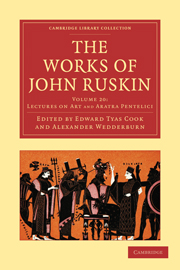Book contents
- Frontmatter
- Contents
- LIST OF ILLUSTRATIONS
- INTRODUCTION TO THIS VOLUME
- LIST OF RUSKIN'S OXFORD LECTURES DURING HIS FIRST TENURE OF THE SLADE PROFESSORSHIP (1870—1878)
- PART I “LECTURES ON ART” (INAUGURAL COURSE DELIVERED AT OXFORD IN HILARY TERM, 1870)
- PART II “ARATRA PENTELICI” (SIX LECTURES ON THE ELEMENTS OF SCULPTURE, DELIVERED AT OXFORD IN MICHAELMAS TERM, 1870)
- APPENDIX: LECTURES AND NOTES FOR LECTURES ON GREEK ART AND MYTHOLOGY (1870)
- Plate section
INTRODUCTION TO THIS VOLUME
Published online by Cambridge University Press: 07 September 2011
- Frontmatter
- Contents
- LIST OF ILLUSTRATIONS
- INTRODUCTION TO THIS VOLUME
- LIST OF RUSKIN'S OXFORD LECTURES DURING HIS FIRST TENURE OF THE SLADE PROFESSORSHIP (1870—1878)
- PART I “LECTURES ON ART” (INAUGURAL COURSE DELIVERED AT OXFORD IN HILARY TERM, 1870)
- PART II “ARATRA PENTELICI” (SIX LECTURES ON THE ELEMENTS OF SCULPTURE, DELIVERED AT OXFORD IN MICHAELMAS TERM, 1870)
- APPENDIX: LECTURES AND NOTES FOR LECTURES ON GREEK ART AND MYTHOLOGY (1870)
- Plate section
Summary
This volume—containing Lectures on Art and Aratra Pentelici, together with some additional matter related to the latter book—introduces us to Ruskin's first Professorship at Oxford (1870–1878). It was an eventful period in his life. These years saw the death of his mother and his removal to a new home; they were the time of his “most acute mental pain” and “most nearly mortal illness.” Also this was perhaps the busiest period even in his busy life. In it he delivered eleven courses of lectures at Oxford. He wrote guide-books. He published at various intervals portions of works on Botany, on Geology, and on Drawing. He started a library of standard literature. He arranged an Art Collection at Oxford, contributing to it some hundreds of his own drawings—a large number of them made for the purpose—and writing several explanatory catalogues. He founded a Museum at Sheffield. He engaged in several social experiments; the better sweeping of the streets in St. Giles's and the sale of tea at a fair price were not too trivial for his efforts, nor the reformation of England, through a Companionship of St. George, too large. He wrote incessantly to the newspapers on topics of the day; and all the while he poured forth, at monthly intervals, that strange and passionate medley of information, controversy, homily, reminiscence, and prophecy which he entitled Fors Clavigera. These tasks were undertaken, not one thing at a time, but often all at the same time. “Head too full,” he wrote in his diary (February 12, 1872), “and don't know which to write first.”
- Type
- Chapter
- Information
- The Works of John Ruskin , pp. xvii - lxiiPublisher: Cambridge University PressPrint publication year: 2010First published in: 1905



